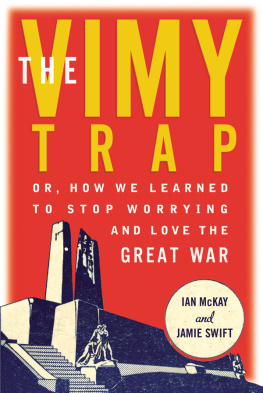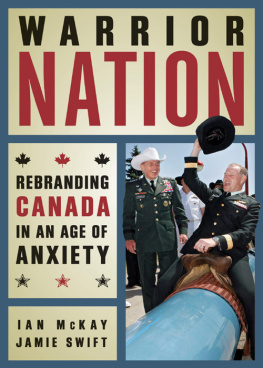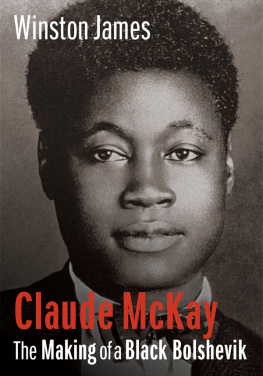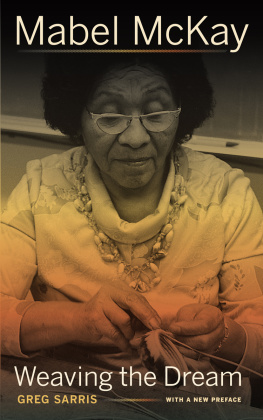REBELS, REDS, RADICALS
Rebels, Reds, Radicals is the inaugural volume in PROVOCATIONS , a series of concise works advancing broad arguments, written by authors deeply immersed in their fields.
Rebels, Reds, Radicals also serves as the introduction to Realms of Freedom, Ian McKays forthcoming multi-volume history of socialism and radicalism in Canada.
REBELS, REDS, RADICALS
Rethinking Canadas Left History
Ian McKay
Rebels, Reds, Radicals
2005 by Ian McKay
First published in Canada in 2005 by
Between the Lines
720 Bathurst Street, Suite #404
Toronto, Ontario M5S 2R4
1-800-718-7201
www.btlbooks.com

All rights reserved. No part of this publication may be photocopied, reproduced, stored in a retrieval system, or transmitted in any form or by any means, electronic, mechanical, recording, or otherwise, without the written permission of Between the Lines, or (for photocopying in Canada only) Access Copyright, 1 Yonge Street, Suite 1900, Toronto, Ontario, M5E 1E5.
Every reasonable effort has been made to identify copyright holders. Between the Lines would be pleased to have any errors or omissions brought to its attention.
Library and Archives Canada Cataloguing in Publication
McKay, Ian, 1953-
Rebels, reds, radicals : rethinking Canadas left history / Ian McKay.
Includes bibliographical references and index.
ISBN 1-896357-97-0
1. SocialismCanadaHistory, 2. CanadaPolitics and government.
3. Right and left (Political science) I. Title.
HX109.M35 2005 335.00971 C2005-901528-4
Cover and text design by Jennifer Tiberio
Printed in Canada by union labour

Between the Lines gratefully acknowledges assistance for its publishing activities from the Canada Council for the Arts, the Ontario Arts Council, the Government of Ontario through the Ontario Book Publishers Tax Credit program and through the Ontario Book Initiative, and the Government of Canada through the Book Publishing Industry Development Program.
To my partner Robert Vanderheyden
Contents
Acknowledgements
P ARTS OF THIS BOOK draw on previously published articles: The Liberal Order Framework: A Prospectus for a Reconnaissance of Canadian History, Canadian Historical Review 81, 3 (September 2000): 617-45; and For a New Kind of History: A Reconnaissance of 100 Years of Canadian Socialism, Labour/Le Travail 46 (Fall 2000): 69-125. I thank the editors of these journals for their permission to use this material.
I would like to thank Carmen Neilson-Varty, Kate Muller, David and Robin McKay, and Amanda Crocker for research assistance. From Between the Lines, Paul Eprile and Jamie Swift have been generous with their encouragement, and Robert Clarke has been a wonderful editor. My good friend Sue Galvin and my sister Kitty Lewis have been great sources of strength. At Queens University, I owe a special debt to the students in my History of Canadian Socialism seminar; they fill me with a sense of the big things that a new generation of leftists in Canada will accomplish.
ONE
Realms of Freedom,
Realms of Necessity
I N 1998 THE PLANETS two hundred wealthiest residents had a net worth equal to about 41 per cent of the total world population. A very few favoured individualsBill Gates, the principal owners of Wal-Mart, and the Sultan of Bruneitogether enjoyed accumulations of wealth equal to the national incomes of thirty-six of the worlds most impoverished countries.
Meanwhile about 1.3 billion people around the world were making do on the equivalent of about one U.S. dollar a day. In Canada, one of the wealthiest countries in the world, poverty increased dramatically from 1990 to 1995, particularly in metropolitan centres. In large cities the general population grew by 6.9 per cent between 1900 and 1995; those with living standards below the Statistics Canada poverty line increased in numbers by 24.5 per cent. Women in Canada are still the poorest of the poor: their pre-tax incomes amount to 62 per cent of mens incomes; they make up a disproportionate share of the population with low incomes2.4 million in 2001 compared to 1.9 million men. At the turn of the twenty-first century, more than a decade after the House of Commons
In the first decade of the new century, global warming proceeds at a faster pace than at any time during the past four hundred to six hundred years. Since the beginning of the twentieth century the mean surface temperature of the Earth has increased by about 0.6 degrees Celsius; about half of that warming has taken place in the past forty years. The impact on the Arctic has been striking. Scholars report a 40 per cent reduction in the thickness of the ice pack and new ailments such as lungworms in muskoxen. The global sea level rose faster in the last century than it did in the previous three thousand years. With continued global warming, billions of people face unimaginable calamities. The glacier-fed rivers of the Himalayas, which supply water to one-third of the worlds population, are likely to flood. Latin Americans confront the prospect of a severe water shortage.
The forty-two million people who have contracted HIV/AIDS confront, as did the twenty-two million already killed by the disease, crumbling health-care systems and a profit-oriented pharmaceutical industry. In 2003, one countrythe United Statesvoted against a United Nations resolution calling for open access to drugs to meet this global health emergency.
This general state of affairs, we are told again and again, every day, by a hundred voices and in a hundred ways, is the only way things can possibly be: all of these massive patterns are beyond human control; you might try to change one or two details, you cannot change the big picture; to imagine a radically different world that does not generate patterns like the ones we are now seeing is to succumb to a delusion.
This delusionthat another world is possible is traditionally called the left.
THE REAL UTOPIA
To be a leftista.k.a. socialist, anarchist, radical, global justice activist, communist, socialist-feminist, Marxist, Green, revolutionarymeans believing, at a gut level, It doesnt have to be this way. Vivre autrementlive otherwise! Live in another way! was a slogan used by one Quebec radical group in the 1970s. Reasoning Otherwise was the slogan of William Irvine, the legendary Prairie socialist. Words like these are inscribed on the heart of every leftist.
Of course, every one of the social problems of the dayfrom growing inequality to global warminghas its own story. It is properly addressed by its own experts. Such problems cannot simply be lumped together. Each demands its own response. So why not just do what is pragmatically possible, and tackle one issue at a time?
Just so. Living otherwise means engaging with the life-and-death, down-to-earth issues as they present themselves. Living and reasoning otherwise mean the mobilization of resources to handle the emergencies of everyday life.












